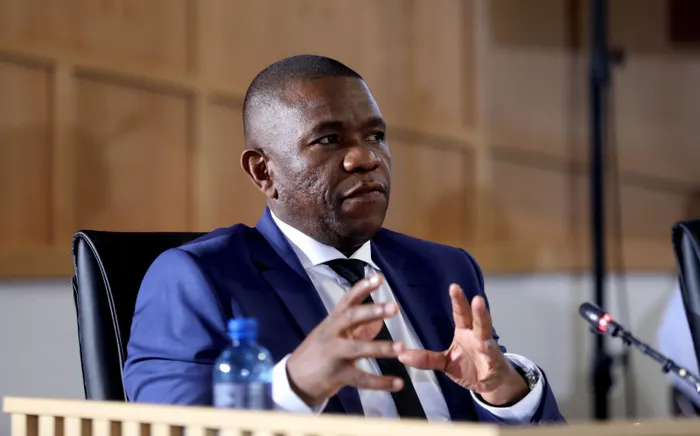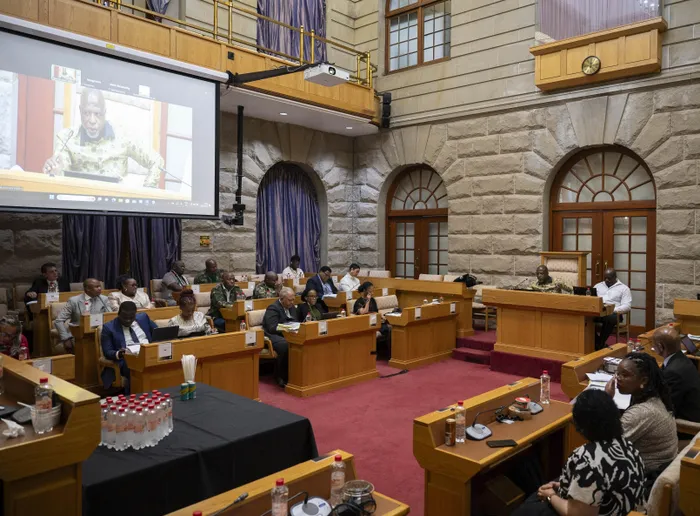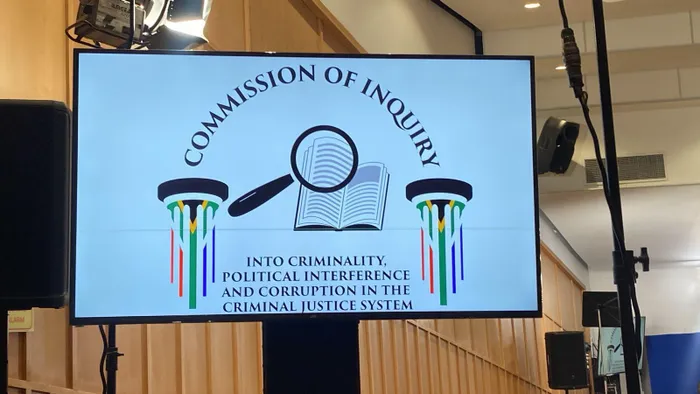
KZN Police Commissioner Lt-General Nhlanhla Mkhwanazi.
Image: Independent Newspapers
The evidence that has emerged in both the Madlanga Commission and Parliament’s Ad Hoc Committee, which are probing explosive allegations made by Lieutenant-General Nhlanhla Mkhwanazi, has been described as indicating that the problem “is even bigger and more comprehensive” than what was previously known.
This view is shared not only by political experts but also by Members of Parliament (MPs), who have unpacked and examined the testimonies from witnesses, offering their thoughts on both streams.
Both Parliament’s hearing and the commission seek to uncover political interference in the demise of the Political Killings Task Team (PKTT), the existence of a potentially corrupt relationship between certain individuals and the Minister of Police, and organised drug cartels that involve various role players across the criminal justice value chain.
Political analyst Professor Sipho Seepe said that what he likes about the two approaches is that they have a different mandate.
“The Madlanga Commission's mandate has been stipulated by the president, and it is a more executive-driven mandate, based on the president's own understanding of the issues.
“The parliamentary investigation and hearings are based on the role of oversight that Parliament has over government, over the public service. The recommendations that come from Madlanga will simply be mere recommendations, and the president can do what he wants with that. So he can choose to ignore them.
“But the recommendation that may come from Parliament, those cannot be ignored. They are not dependent on the president. So that is a major distinction that we must understand.”

Members of Parliament during at the Ad Hoc Committee investigating allegations brought forward by KwaZulu-Natal Police Commissioner Nhlanhla Mkhwanazi.
Image: Armand Hough / Independent Newspapers
Political scientist at the North-West University, Professor André Duvenhage, said what he likes about “the two-tier approach” is that there is a process where people are presenting their views, and in the process, showing that the problem within the system is more alarming than previously known.
“One is a commission where you can provide evidence based on anonymity, and they will report to the president - there is a bit of a problem in the sense that the president is also implicated by a lot of this - but then the other process has its own challenges in terms of party, political, and senior individuals, who have conflicts of interest, but at least we have several political parties involved.
“We have cross-questioning going on, and we have seen diverse evidence coming through the system, implicating yet again senior officials, and the general analysis coming out of the one process, to a large extent, is similar to what is going on in the other process,” Duvenhage said.
“One is in a way verifying the other, making it more substantive.”
Seepe added: “Both serve a purpose where their various methodologies may converge, providing us with a truer picture. This is why the Ad Hoc Committee will also refer now and then to the Madlanga Commission, but the Madlanga Commission has no interest in what happens within the Ad Hoc Committee because that's a different space.”
Seepe added that the Ad Hoc Committee has been more rigorous than the commission, as the Madlanga Commission would be more limited in its scope, while MPs have the benefit of asking whatever they want, and in whatever manner they choose.
“Both of them have been revelatory. Revelatory in the sense that we've come to know more about what is happening both in the South African Police Service.
“We have come to know who the players are who have infiltrated the SAPS, and we've also come to know that the judiciary is not as innocent as we always thought,” Seepe said.

The Madlanga Commission of Inquiry was told that the Hawks operation at the Sandhurst home of murder-accused Katiso 'KT' Molefe is unaccounted for in the unit's records.
Image: Kamogelo Moichela / IOL
“Something that should have been obvious to South Africans is that judges are simply mere mortals, but it was deliberate to make judges appear like they're superhuman beings, as if they're incorruptible.
“What they both have actually shown is the normalisation, and the humanisation of judges that judges are mere mortals, they are also human beings, and they are also fallible,” he said.
Duvenhage added that it has been concerning to see witnesses hesitant to testify under their own name at the Madlanga Commission, and the resignation of evidence leader Advocate Terry Motau SC, and also Lt-Gen. Dumisani Khumalo falling ill.
“There are safety problems within the context of this investigation.”
Duvenhage further stated that a negative side to the whole commission, “and that is a design fault, is the fact that he must report to people that is implicated, and that is the President (Cyril Ramaphosa)”.
"And the president is now implicated in several locations. His relationship with people like Vusimuzi 'Cat' Matlala and others surfaced in some ways. His direct or indirect connection to the (Tembisa) hospital scandal, in some ways.
“So now you have a complete report, reporting to the president, (being given) to the president being implicated.”
The Presidency has been contacted for comment, but has yet to respond.
Duvenhage said that the ANC is in a game of political survival “because what is said by Mkhwanazi and what we learned from the testimonies coming from several witnesses and people subpoenaed to testify is severe”.
“I believe in terms of impact, this is probably the most severe crisis that the ANC has had since 1994. It may not be as comprehensive as State Capture, but it is very specific on certain issues and specific to certain individuals.
“It is in the public eye, on a daily basis, influencing public opinion. In that sense, it's even bigger than the Zondo Commission, although the investigation is a lot smaller than Zondo, but its political impact may be a lot more,” Duvenhage said.
Seepe agreed, saying commissions are not useful instruments in holding people accountable, as “even though nothing has happened with the Zondo Commission recommendations, the ANC came out as the accused number one, and the election also showed that the people have been listening to Zondo Commission and have decided to use their understanding of the party that has always enjoyed the majority, and they chose, as a result of that revelation, to punish that party”.
Speaking of their thoughts on their work, MPs said that they can see a bigger picture coming out of the testimonies.
uMkhonto weSizwe Party's (MKP) Thulani Shongwe said: “As MKP representatives on the committee, we are cautiously optimistic but firm in our view that progress has been uneven.
“The testimonies from Lt-Gen Mkhwanazi and Lt-Gen Khumalo have been invaluable in exposing systemic infiltration by organised crime syndicates into the SAPS and the justice system, issues we've long warned about, including the need for radical transformation to dismantle captured structures rooted in outdated frameworks.
“However, the process has been hampered by delays, supplementary statements, and what appears to be reluctance from certain quarters to fully engage,” Shongwe said.
“The bravery shown by whistle-blowers like Mkhwanazi gives us hope, but true progress demands unyielding commitment from all members to prioritise justice over protectionism.”

Members of Parliament David Skosana, Sibonelo Nomvalo, and Thulani Shongwe, who represent the MKP on the Ad Hoc Committee.
Image: RSA Parliament / Supplied
ActionSA’s Dereleen James said she remains uncertain that the committee is making strides in achieving its objectives.
“There are days when I leave this Ad Hoc Committee, where I ask myself what was actually said today… I was just saying to my colleagues earlier on, it seems as if only at the end of all the hearings and all the testimonies, only then will we be able to put the pieces together.”
Inkatha Freedom Party’s Mangaqa Albert Mncwango said: “Undoubtedly, a picture is emerging and becoming clear. It is becoming very clear that we have our hands full here. There is a lot more that meets the eye. As we progress meeting, and cross-examining the other witnesses that are in the line-up, I’m sure that the picture is going to become even clearer for the people out there that the rot has gone so, so deep in this country.”
Seepe added that it is very clear that the system is broken.
“When you have the most senior SAPS people being called and being found wanting, it doesn't augur well. So the people are saying we want to have a system that we can trust, and at the moment, it does not look good.”
According to everyday South Africans, Itumeleng Lelaka said: “I’ve been following the Ad Hoc Committee proceedings, though not every day. What I’ve seen has truly changed the way I view our police officers and the Hawks as a whole. I always knew our crime intelligence system had its flaws, but I didn’t realise just how deep the problems run.”
Byron Hartung said: “It doesn't mean anything to me; the last commission did absolutely nothing. What will this one do? It hasn't affected my day-to-day.... However, I have been contemplating that corruption actually makes money, and there are no real consequences (for it), so what is stopping others from trying it?”
theolin.tembo@inl.co.za